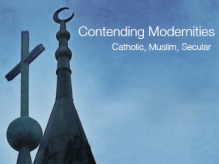
The University of Notre Dame, in partnership with scholars and educators from around the world, is inaugurating a major cross-cultural research project: Contending Modernities: Catholic, Muslim, Secular.
The following public launch events will take place in New York on November 18 and 19 at the Sheraton New York, 811 7th Avenue (53rd Street).
At 4 p.m. on Thursday, November 18, Rev. John I. Jenkins, C.S.C., president of the University of Notre Dame, will introduce the keynote speakers: Shaykh Ali Gomaa, Grand Mufti of Egypt; Jane Dammen McAuliffe, president of Bryn Mawr College and past president of the American Academy of Religion; and John T. McGreevy, professor of history and I.A. O’Shaughnessy Dean of the College of Arts and Letters at Notre Dame.
At 10 a.m. on Friday, November 19, a panel discussion entitled “Women, Family, and Society in Islam and Catholicism” will feature Ingrid Mattson, past president of the Islamic Society of North America; M. Cathleen Kaveny, John P. Murphy Foundation Professor of Law and Professor of Theology at Notre Dame; Shahla Haeri, associate professor of cultural anthropology and director of women’s studies at Boston University; and Jacqueline Moturi Ogega, director of the Women’s Mobilization Program at Religions for Peace.
Designed to unfold over several years, Contending Modernities will generate new knowledge and understanding of the ways in which religious and secular people and institutions interact, for good and ill, says Scott Appleby, professor of history, director of Notre Dame’s Kroc Institute for International Peace Studies, and director of Contending Modernities.
“The problem of religious violence and tensions among religions and between the religious and secular forces are more sharply defined than ever,” Appleby says. “Our vision with this research project is to harness the power of ideas to chart a way forward across religious and secular divides to address the greatest challenges of the 21st century.”
Dozens of Catholic, Muslim, and secular scholars and public intellectuals will be involved in the project, which in the future will expand to engage all the major world religions.


